Introduction
Cape Town South Africa, fondly known as the Mother City, is one of the most strikingly beautiful destinations in the world. Nestled at the foot of the majestic Table Mountain and bordered by the sparkling waters of the Atlantic Ocean, the city offers a rare combination of breathtaking landscapes, cultural depth, and historical significance.
Unlike many urban centers, Cape Town blends the energy of a modern metropolis with a rich cultural heritage and natural wonders located just minutes from the city center. Visitors can wander through the colorful streets of Bo-Kaap, ride the cable car up Table Mountain, explore the lively V&A Waterfront, or reflect on South Africa’s freedom struggle on Robben Island. Every corner of the city tells a story, making it a destination where history, culture, and scenery come together seamlessly.
Geography and Setting
Cape Town is located on the southwestern tip of South Africa, in the Western Cape Province. Its geography is both dramatic and unforgettable. Towering above the city is Table Mountain, flanked by Lion’s Head and Devil’s Peak, which together form the famous “City Bowl.” Stretching further south is the Cape Peninsula, ending at the rugged cliffs of the Cape of Good Hope, where two mighty oceans converge.
The climate is Mediterranean, with warm, dry summers (November to March) that are perfect for beaches and outdoor adventures, and cool, wetter winters (June to August) that create dramatic scenery with fewer crowds. Spring brings bursts of wildflowers along the coast, while autumn is ideal for wine tours in nearby vineyards. This climate ensures that Cape Town remains appealing throughout the year.
A Brief History of Cape Town
Cape Town’s history is as layered as its cultural landscape. Long before colonial settlement, the land was home to the Khoisan people, who lived off the sea and natural resources.
In 1652, Jan van Riebeeck of the Dutch East India Company established a refreshment station at the Cape of Good Hope to supply ships traveling to Asia. This marked the start of Cape Town as a colonial outpost. Over time, the settlement expanded, shaped by European settlers and enslaved people brought from Asia and Africa, creating a cultural blend that still defines the city today.
In the 19th century, Britain seized control of the Cape, introducing new political and architectural influences. During the apartheid era of the 20th century, Cape Town became a stage for both oppression and resistance. The forced removals in District Six and the imprisonment of freedom fighters on Robben Island left deep scars on the city.
The release of Nelson Mandela in 1990, followed by the birth of democracy in 1994, marked a new chapter in Cape Town’s history. Today, the city stands as a symbol of resilience and transformation, welcoming travelers from around the world to learn from its past while experiencing its vibrant present.
Culture and Lifestyle
Cape Town is often described as a city of many cultures, where traditions from Africa, Europe, Asia, and the Middle East intersect. This cultural blend is the result of centuries of migration, trade, and colonial history, and it is visible in the city’s neighborhoods, food, music, and art.
Multicultural Influences
Few places reflect this diversity more vividly than Bo-Kaap, where brightly painted houses line cobblestone streets, and the aroma of Cape Malay spices fills the air. Elsewhere, the Dutch and British colonial legacies are preserved in historic churches and grand government buildings. Meanwhile, Xhosa traditions, as well as Indian and Malaysian influences, remain integral to daily life, making Cape Town’s cultural identity truly distinctive.
Languages in the City
South Africa has 11 official languages, and in Cape Town, the most widely spoken are English, Afrikaans, and isiXhosa. English dominates in tourism, hospitality, and business, making it easy for international visitors to communicate.
Food and Cuisine
Cape Town’s culinary scene mirrors its cultural diversity. Some must-try dishes and experiences include:
-
Cape Malay cuisine, with specialties such as bobotie (spiced minced meat baked with an egg topping) and fragrant curries.
-
Seafood platters, featuring calamari, snoek, prawns, and oysters fresh from the Atlantic Ocean.
-
A traditional braai (South African barbecue), which is more than just a meal — it is a social tradition.
-
Fine wines from the Cape Winelands, paired with gourmet dining in the city’s top restaurants.
Art, Festivals, and Music
Creativity thrives in Cape Town. The Zeitz Museum of Contemporary Art Africa (MOCAA) highlights modern African art, while smaller galleries across the city showcase local talent. Festivals such as the Cape Town Carnival and the International Jazz Festival celebrate music, dance, and cultural expression. Street performers, African drumming circles, and lively jazz clubs contribute to the city’s vibrant atmosphere.
Top Tourist Attractions in Cape Town
Cape Town combines natural wonders with cultural landmarks, offering attractions that appeal to travelers of all kinds.
Table Mountain
The city’s most iconic landmark, Table Mountain, dominates the skyline.

-
Cable Car: The rotating cableway carries visitors to the summit in minutes, offering panoramic views of the city, ocean, and mountains.
-
Hiking Trails: Routes such as Platteklip Gorge provide challenging but rewarding treks.
-
Best Experience: Watching the sunset from the top is particularly memorable.
Robben Island
A site of immense historical significance, Robben Island is where Nelson Mandela and other anti-apartheid leaders were imprisoned.
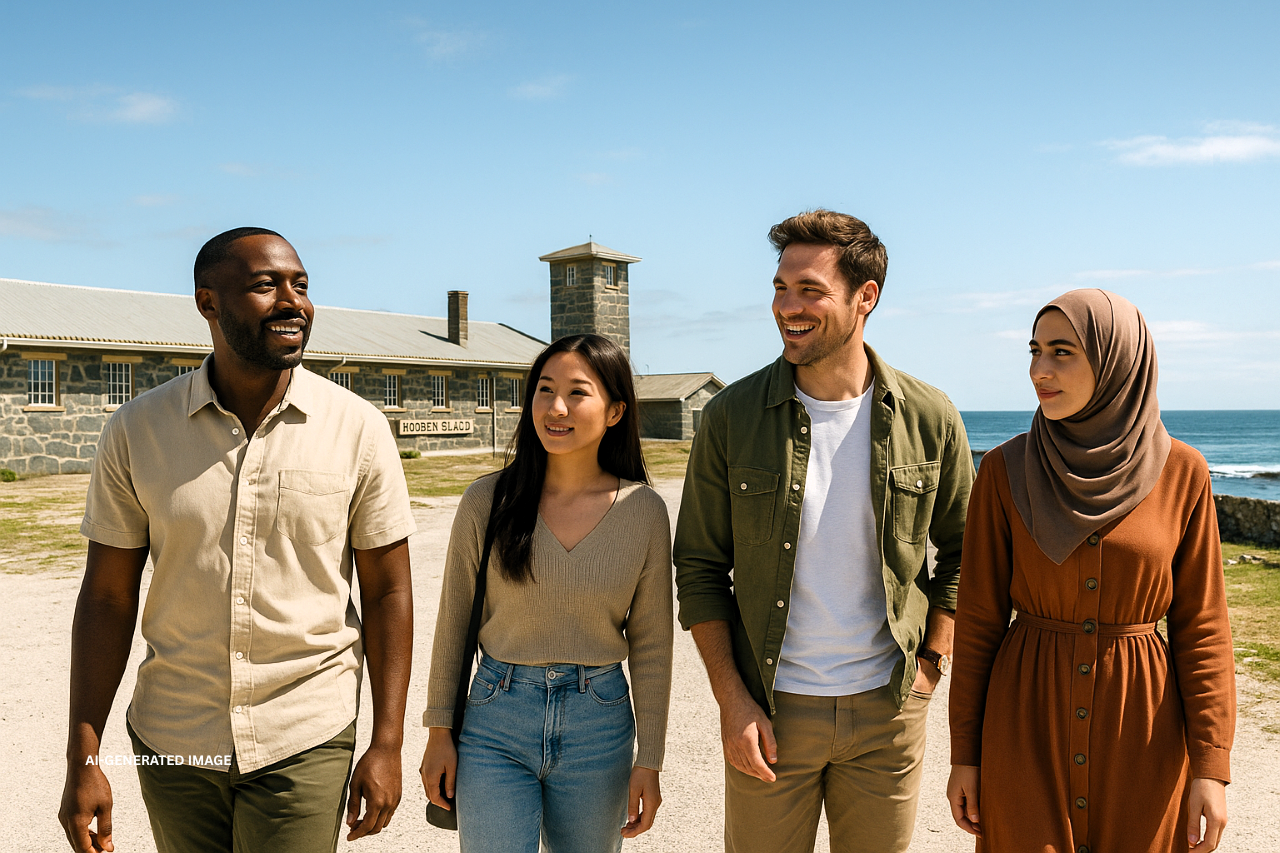
-
Guided Tours: Often led by former prisoners, offering personal perspectives on life under apartheid.
-
Highlights: Mandela’s prison cell, the limestone quarry, and the main prison buildings.
V&A Waterfront
The Victoria & Alfred Waterfront is one of Cape Town’s most popular attractions.
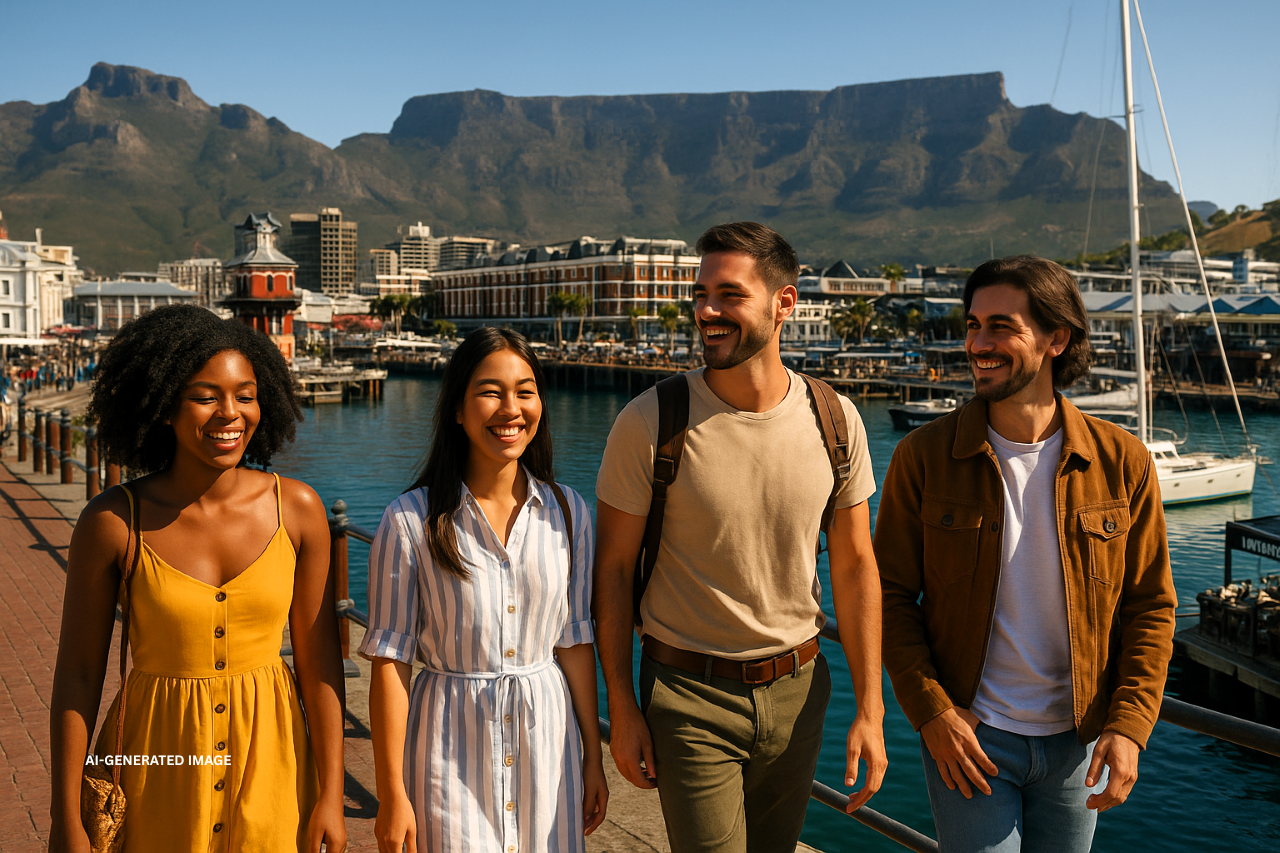
-
Shopping and Dining: A mix of luxury boutiques, local craft stores, and excellent restaurants.
-
Two Oceans Aquarium: A fascinating display of marine life from the Atlantic and Indian Oceans.
-
Leisure Options: Sunset cruises, live performances, and harbor views.
Kirstenbosch National Botanical Garden
Situated on the eastern slopes of Table Mountain, Kirstenbosch is regarded as one of the finest botanical gardens in the world.
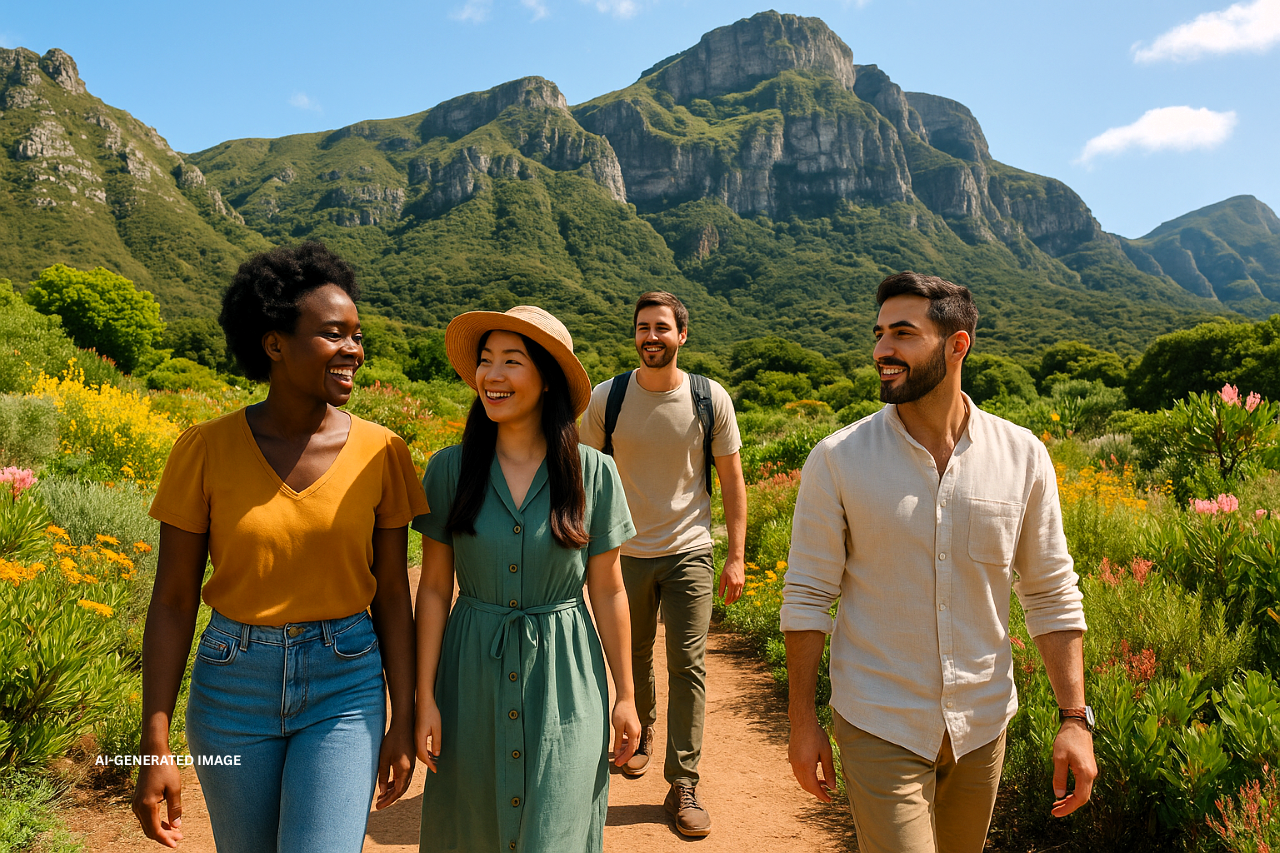
-
Showcases the flora of the Cape Floral Kingdom, with thousands of indigenous plant species.
-
The Boomslang Canopy Walkway allows visitors to stroll above the treetops.
-
Seasonal summer concerts add to the garden’s appeal.
Camps Bay and Clifton Beaches
Cape Town is famous for its beaches, and Camps Bay and Clifton are the most glamorous.

-
Camps Bay:
-
Known for its lively promenade lined with cafes and restaurants.
-
Clifton’s Four Beaches:
-
Celebrated for turquoise waters, white sands, and stunning backdrops.
Both locations are perfect for sunbathing, swimming, or enjoying the sunset.
Bo-Kaap
The Bo-Kaap neighborhood is as culturally rich as it is visually striking.
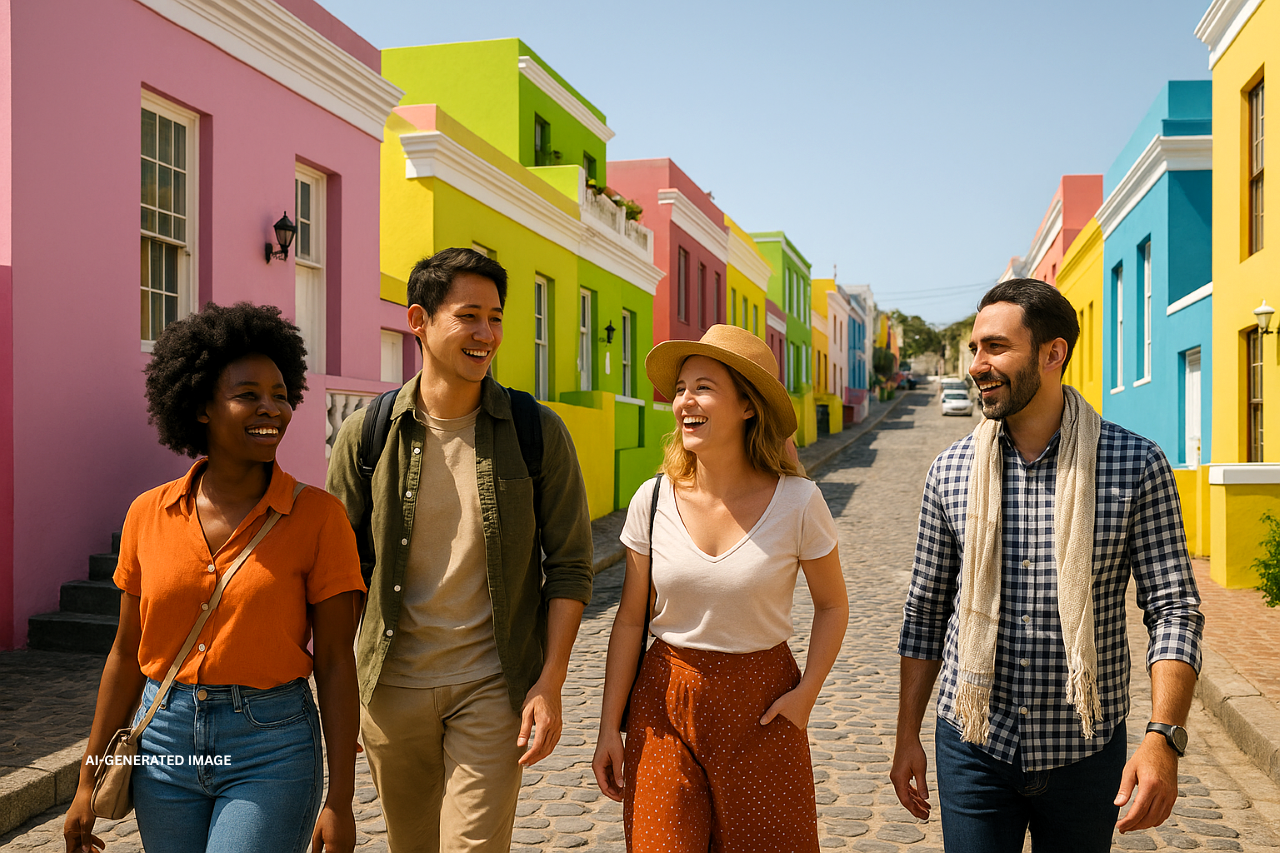
-
Its brightly colored houses and cobbled streets are tied to Cape Malay heritage.
-
Cooking classes offer visitors the chance to learn traditional recipes.
-
The Bo-Kaap Museum provides insights into the community’s history.
Cape Point and the Cape of Good Hope
At the southern tip of the Cape Peninsula lies Cape Point, a dramatic nature reserve.
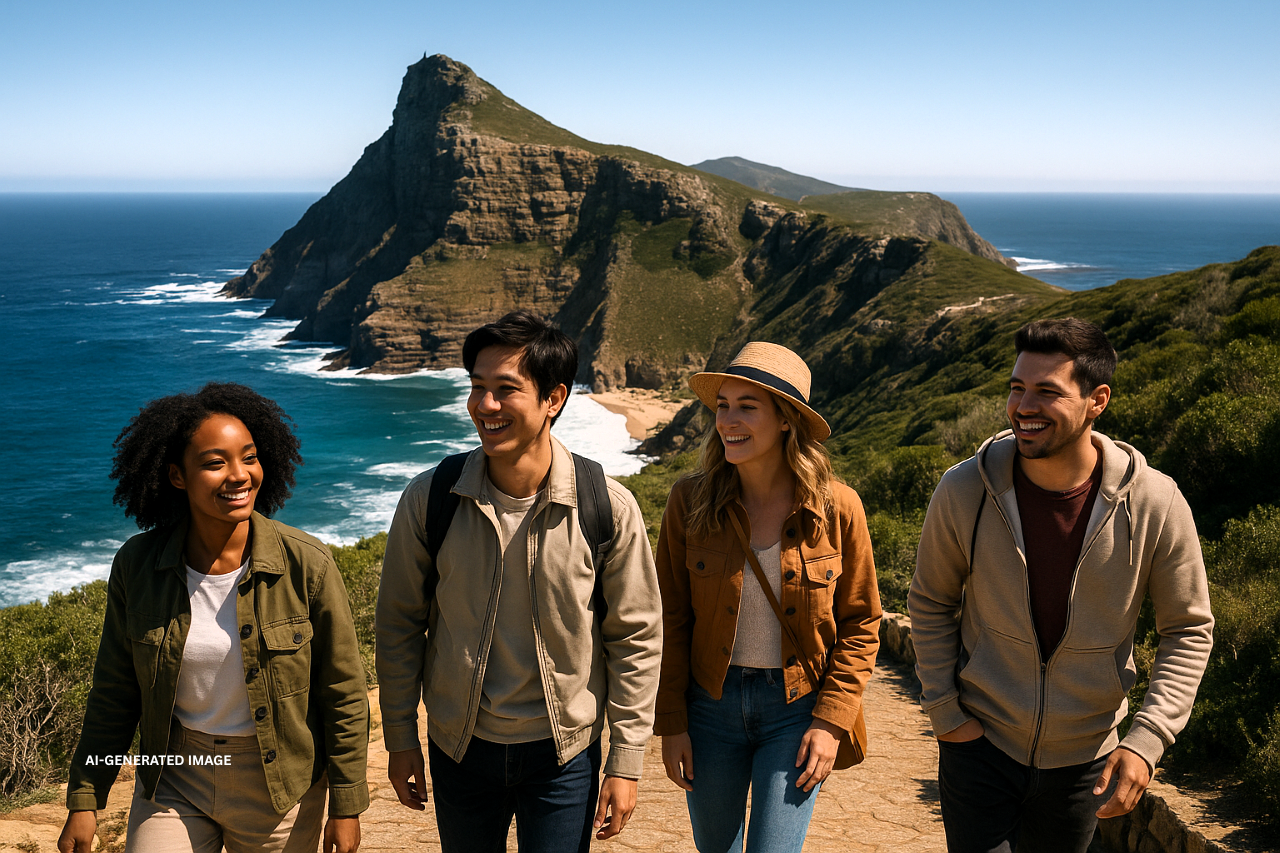
-
Cape of Good Hope:
-
Once dreaded by sailors, it is now a celebrated landmark.
-
Wildlife:
-
The reserve is home to baboons, ostriches, and antelope.
-
Chapman’s Peak Drive:
-
A breathtaking coastal route leading to the reserve.
District Six Museum
The District Six Museum tells the story of forced removals during apartheid.
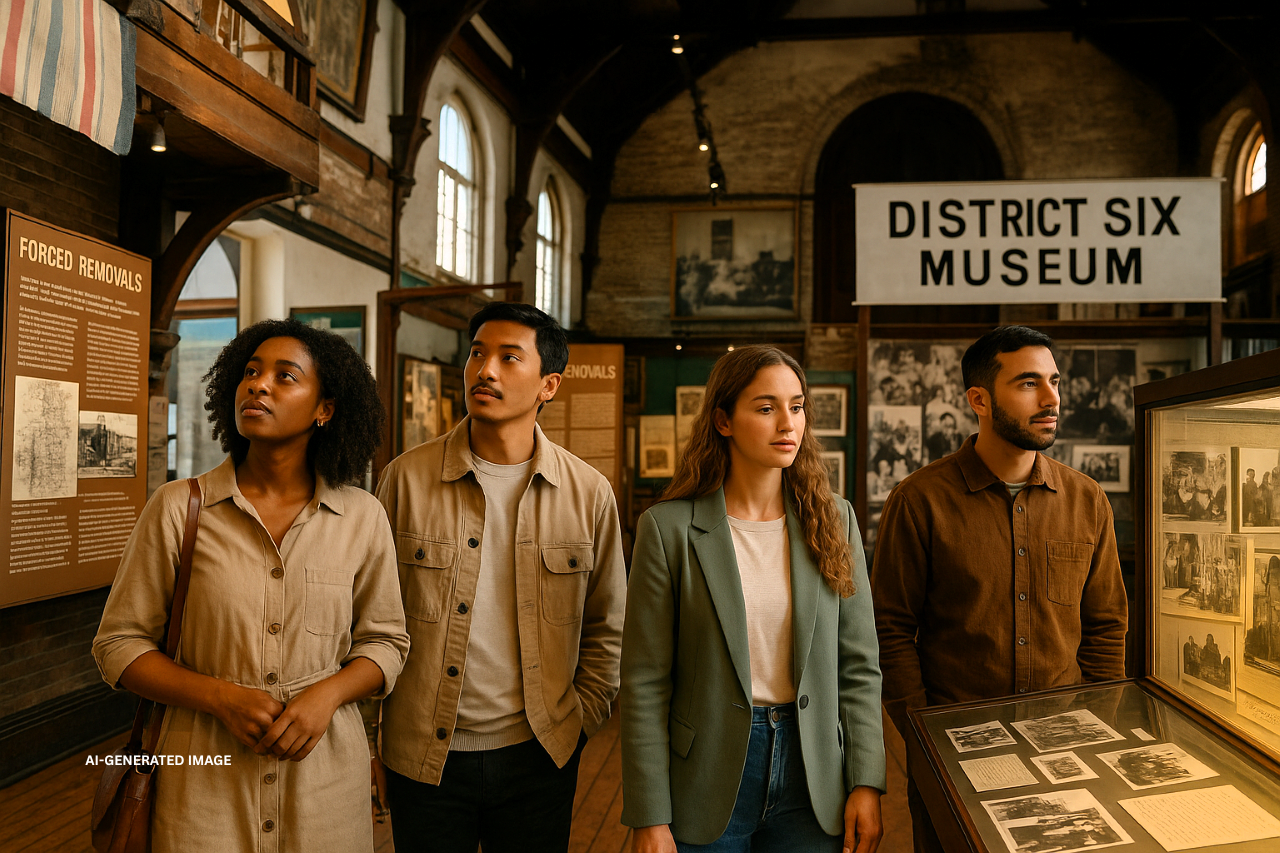
-
Exhibits include photographs, oral histories, and personal belongings of displaced families.
-
It serves as a moving reminder of Cape Town’s past and its journey toward reconciliation.
Outdoor Adventures and Nature
For travelers who love the outdoors, Cape Town, South Africa, is a natural playground. With its mountains, coastlines, and diverse wildlife, the city offers activities ranging from high-energy adventures to relaxed scenic explorations.
Hiking Trails
-
Lion’s Head:
-
A moderately challenging trail popular for sunrise and full-moon hikes. The spiral path offers sweeping views of the city, Table Mountain, and the Atlantic Ocean.
-
Devil’s Peak:
-
A more demanding route, but less crowded than Table Mountain. Hikers are rewarded with expansive views over Table Bay and False Bay.
-
Table Mountain:
-
Trails such as Platteklip Gorge allow visitors to reach the summit on foot. Many hikers climb up and take the cable car down for a balanced experience.
Paragliding from Signal Hill
For adrenaline seekers, paragliding from Signal Hill is an unforgettable way to see Cape Town. Gliding above the city, visitors enjoy unmatched aerial views of beaches, neighborhoods, and mountain peaks.
Surfing at Muizenberg
Muizenberg Beach, often called the birthplace of South African surfing, is ideal for beginners thanks to its gentle waves and sandy shoreline. Advanced surfers can head to Kommetjie or Big Bay for more challenging conditions.
Shark Cage Diving
Located about two hours from the city, Gansbaai is world-famous for shark cage diving. This heart-pounding activity lets adventurers safely observe great white sharks in their natural environment.
Wine Tours in the Cape Winelands
Just beyond Cape Town, the Cape Winelands provide a scenic escape filled with rolling vineyards and historic estates. Towns such as Stellenbosch, Franschhoek, and Paarl offer wine tastings, cellar tours, and gourmet dining experiences.
Food and Drink Experiences
The culinary landscape of Cape Town reflects its multicultural roots and access to fresh local ingredients.
Traditional Dishes
-
Bobotie:
-
A spiced mince dish topped with an egg-based custard, often regarded as South Africa’s national dish.
-
Bunny Chow:
-
A hollowed loaf of bread filled with curry, a favorite across the country.
-
Biltong:
-
A dried, cured meat snack that is widely enjoyed by locals and travelers.
Fresh Seafood
With the Atlantic Ocean at its doorstep, Cape Town is a paradise for seafood lovers. Grilled snoek, calamari, prawns, and oysters are staples at restaurants along the coast and the V&A Waterfront.
Wine and Craft Beer
The Cape Winelands produce internationally acclaimed wines, from crisp whites to robust reds. In recent years, the city has also embraced craft beer culture, with local breweries offering innovative flavors.
Dining with a View
Whether it’s a fine-dining experience at La Colombe or cocktails at a rooftop bar overlooking Table Mountain, Cape Town combines delicious food with stunning settings.
Shopping and Souvenirs
Cape Town is a fantastic place to shop for one-of-a-kind souvenirs that showcase its culture and artistry.
Greenmarket Square
One of the oldest markets in the city, Greenmarket Square, is filled with stalls selling African crafts, beadwork, textiles, and wooden carvings. Bargaining with vendors is part of the experience.
Local Crafts and Art
-
Handmade masks, pottery, and beadwork: Representing African heritage.
-
Cape Malay spices:
-
A fragrant reminder of the city’s food culture.
-
Contemporary art:
-
Found in studios and galleries, especially in Woodstock.
Fashion and Jewelry
Cape Town is home to innovative local designers. Boutiques at the V&A Waterfront and along Kloof Street feature clothing, accessories, and jewelry created by South African artisans.
Day Trips from Cape Town
Cape Town’s location makes it an ideal base for short trips to equally impressive destinations.
Cape Winelands
Less than an hour away, Stellenbosch and Franschhoek are perfect for wine lovers. Visitors can sample award-winning vintages, tour cellars, and enjoy gourmet meals in picturesque settings.
Boulders Beach
Located in Simon’s Town, Boulders Beach is home to a thriving colony of African penguins. Boardwalks allow visitors to get close to the birds without disturbing their natural environment.
Chapman’s Peak Drive
Considered one of the world’s most scenic drives, Chapman’s Peak Drive winds along cliffs overlooking the Atlantic Ocean. It is a must for photographers and road-trippers.
Hermanus
About two hours from Cape Town, Hermanus is one of the world’s best whale-watching spots. From June to November, southern right whales can often be seen directly from the shoreline.
Nightlife and Entertainment
As the sun sets, Cape Town comes alive with a wide range of nightlife options.
Long Street
Long Street is the city’s entertainment hub, filled with pubs, clubs, and bars. Its lively, bohemian vibe attracts both locals and tourists.
Jazz Culture
Cape Town is often described as the jazz capital of Africa. Venues such as The Crypt and Asoka feature live performances that blend African rhythms with global jazz traditions.
Theatres and Performances
For cultural evenings, the Artscape Theatre Centre hosts operas, ballets, plays, and musicals. Smaller theaters and music venues around the city provide more intimate experiences.
Festivals and Events
Cape Town, South Africa, is a city that embraces celebration. Its annual festivals highlight music, food, art, and cultural traditions, drawing both locals and visitors into the festivities.
Cape Town International Jazz Festival
Held every March, the Cape Town International Jazz Festival is one of the largest in the world. It attracts international jazz legends and local talent, filling the city with rhythm and energy.
Cape Town Carnival
The Cape Town Carnival, also in March, is a dazzling parade of floats, dancers, and musicians. The event celebrates creativity and diversity, with communities from across the city participating.
Minstrel Festival (Kaapse Klopse)
On January 2nd, Cape Town hosts the Minstrel Festival, or “Tweede Nuwe Jaar” (Second New Year). Thousands of minstrels in colorful costumes march through the streets, performing music that traces its roots to Cape Town’s history of slavery.
Food and Wine Celebrations
Cape Town is also home to food and wine festivals that showcase its rich culinary traditions. Events such as the South African Cheese Festival and the Franschhoek Bastille Festival highlight local produce, wines, and gourmet creations. Seasonal harvest festivals in the Cape Winelands allow visitors to experience grape picking and wine tastings.
Practical Travel Information
Planning a trip to Cape Town becomes easier with a few essential details in mind.
Best Time to Visit
-
Summer (Nov–Mar):
-
Warm and dry, ideal for beaches, hikes, and festivals.
-
Autumn (Apr–May):
-
Mild weather and smaller crowds, perfect for wine tours.
-
Winter (Jun–Aug):
-
Cool and rainy, but excellent for whale watching and indoor attractions.
-
Spring (Sep–Oct):
-
Blooming wildflowers make this one of the most scenic times to visit.
Getting There
-
By Air: Cape Town International Airport connects the city with major hubs in Africa, Europe, and the Middle East.
-
By Road: Many travelers arrive via road trips, especially along the scenic Garden Route.
Getting Around the City
-
MyCiTi Bus:
-
Affordable, safe, and reliable, covering the airport and key tourist areas.
-
Taxis & Uber:
-
Widely available and convenient for short trips.
-
Car Rentals:
-
Ideal for day trips, exploring the Cape Peninsula, or visiting the Winelands.
Safety Guidelines
Cape Town is safe for tourists who take basic precautions:
-
Avoid deserted areas at night.
-
Keep valuables secure and avoid displaying expensive items.
-
Use official taxis or ridesharing apps rather than unmarked vehicles.
Accommodation Options
Cape Town offers a wide range of accommodations to suit all types of travelers.
Luxury Hotels and Resorts
-
One&Only Cape Town: Known for its elegance and views of Table Mountain.
-
The Twelve Apostles Hotel and Spa is nestled between dramatic mountain cliffs and the Atlantic Ocean.
-
Mount Nelson Hotel: An iconic pink-hued hotel offering a mix of history and luxury.
Boutique Guesthouses
Areas like Camps Bay, Gardens, and Woodstock feature boutique guesthouses that combine personalized service with stylish designs.
Budget-Friendly Stays
Popular hostels such as The Backpack and Once in Cape Town offer affordable lodging with social atmospheres for budget-conscious travelers.
Airbnb and Vacation Rentals
Vacation rentals range from modern city apartments to seaside villas with panoramic ocean views — ideal for families or extended stays.
South Africa’s Main Tourist Attractions Beyond Cape Town
While Cape Town is a jewel in itself, South Africa’s broader attractions add to the country’s appeal.
Johannesburg
-
Apartheid Museum:
-
A profound look at the country’s struggle for freedom.
-
Soweto:
-
Home to Mandela House and the Hector Pieterson Museum.
-
Maboneng Precinct:
-
A creative hub filled with art galleries, restaurants, and nightlife.
Kruger National Park
One of the world’s greatest safari destinations.
-
Wildlife:
-
The Big Five (lion, leopard, elephant, rhino, buffalo).
-
Accommodation:
-
Ranging from luxury lodges to simple campsites.
-
Self-Drive Safaris:
-
A flexible and popular way to explore the park.
Durban
-
Golden Mile:
-
A lively beachfront promenade.
-
uShaka Marine World:
-
A mix of aquarium, water park, and shows.
-
Cuisine:
-
Famous for spicy Indian curries, including the iconic bunny chow.
Garden Route
A coastal road stretching between Mossel Bay and Storms River.
-
Knysna:
-
Known for its lagoon and oysters.
-
Plettenberg Bay:
-
A hotspot for beaches and marine life.
-
Tsitsikamma National Park:
-
Featuring suspension bridges and forest trails.
Drakensberg Mountains
A UNESCO-listed range offering dramatic natural beauty.
-
Hiking Trails:
-
From leisurely walks to multi-day treks.
-
San Rock Art:
-
Ancient cave paintings by the San people.
Sun City
Often called the “Las Vegas of Africa,” Sun City is a luxury resort complex.
-
Attractions:
-
Casinos, water parks, golf courses, and entertainment.
-
Popular with families and those seeking a fun-filled getaway.
Sustainable and Responsible Tourism
With its fragile ecosystems and diverse cultural heritage, Cape Town, South Africa, places great emphasis on responsible travel. Visitors can help preserve its natural beauty and support local communities by choosing eco-friendly and ethical tourism options.
Eco-Friendly Experiences
-
Many tour operators offer eco-conscious activities, such as kayaking, hiking, and wildlife encounters, designed to minimize environmental impact.
-
At Boulders Beach and in Hermanus, strict guidelines ensure that penguins and whales are observed in a way that protects their habitats.
Supporting Local Communities
-
Staying in locally owned guesthouses, dining at small restaurants, and purchasing from artisans directly benefits local families.
-
Community-led township tours provide authentic insights while ensuring revenue supports residents.
Conservation Efforts
-
The Cape Floral Kingdom, one of the richest plant biodiversity regions in the world, is particularly sensitive. Visitors should remain on designated trails and avoid picking plants.
-
Wildlife sanctuaries and rehabilitation centers rely on tourism support to continue protecting endangered species.
Travel Tips for Visitors
A few practical tips will make your trip to Cape Town more enjoyable and stress-free.
Packing Suggestions
-
Summer (Nov–Mar):
-
Bring light clothing, swimwear, sunscreen, and a hat.
-
Winter (Jun–Aug):
-
Pack warm layers, a waterproof jacket, and sturdy shoes.
-
All Year:
-
Comfortable walking shoes are essential for both city exploration and hiking.
Money and Payments
-
The local currency is the South African Rand (ZAR).
-
Credit cards are widely accepted, though small amounts of cash are useful for taxis, tips, and markets.
-
ATMs are available throughout the city.
Customs and Etiquette
-
A friendly greeting is always appreciated; South Africans are known for their warmth.
-
Tipping is customary: 10–15% in restaurants and small amounts for drivers and porters.
-
Always ask permission before photographing people, especially in local communities.
Health and Safety
-
Tap water in Cape Town is generally safe to drink.
-
No special vaccinations are required for the city, though precautions may be needed for other regions.
-
Travel insurance is strongly recommended for unexpected medical or travel issues.
Conclusion
Cape Town, South Africa, is a destination that combines beauty, history, and culture in one unforgettable experience. With Table Mountain’s iconic silhouette, the moving history of Robben Island, the colorful streets of Bo-Kaap, and the peaceful landscapes of Kirstenbosch Gardens, the city offers something for every traveler.
Beyond Cape Town, South Africa’s wider attractions — from Kruger National Park safaris to road trips along the Garden Route — add even more reasons to visit. Yet Cape Town itself remains the heart of the journey, offering a perfect blend of adventure, relaxation, and cultural depth.
It is not just a city to visit; it is a place to experience, reflect upon, and remember long after the trip has ended.
FAQs
What is the best time to visit Cape Town?
The best time is from November to March for warm, dry weather. Spring (Sep–Oct) is ideal for wildflowers, while winter (Jun–Aug) is perfect for whale watching.
How many days should I spend in Cape Town?
Plan for at least 4–5 days to see the highlights. A week allows more time for day trips to the Winelands, Cape Point, and Hermanus.
Is Cape Town safe for tourists?
Yes, if you follow basic precautions such as avoiding isolated areas at night, keeping valuables secure, and using reliable transport services.
What currency is used in South Africa?
The official currency is the South African Rand (ZAR). Credit cards are widely accepted, and ATMs are easy to find.
Can I do a safari from Cape Town?
Yes. While Kruger National Park is far, nearby reserves like Aquila Private Game Reserve offer safari experiences just a few hours away.
Is Cape Town expensive?
Cape Town caters to all budgets, with options ranging from luxury hotels and fine dining to affordable hostels and casual eateries.
What souvenirs should I buy?
Popular souvenirs include African crafts, beadwork, Cape Malay spices, and South African wines.
Do I need a visa to visit South Africa?
Visa requirements vary by nationality. Many visitors enjoy visa-free entry for short stays, but always check with the South African consulate before traveling.
What is the easiest way to get around Cape Town?
The MyCiTi Bus, Uber, and taxis are convenient for city travel. For day trips, renting a car provides the most flexibility.
What makes Cape Town unique compared to other cities?
Cape Town’s rare combination of mountains, beaches, vineyards, and cultural history makes it one of the most distinctive and beautiful cities in the world.
